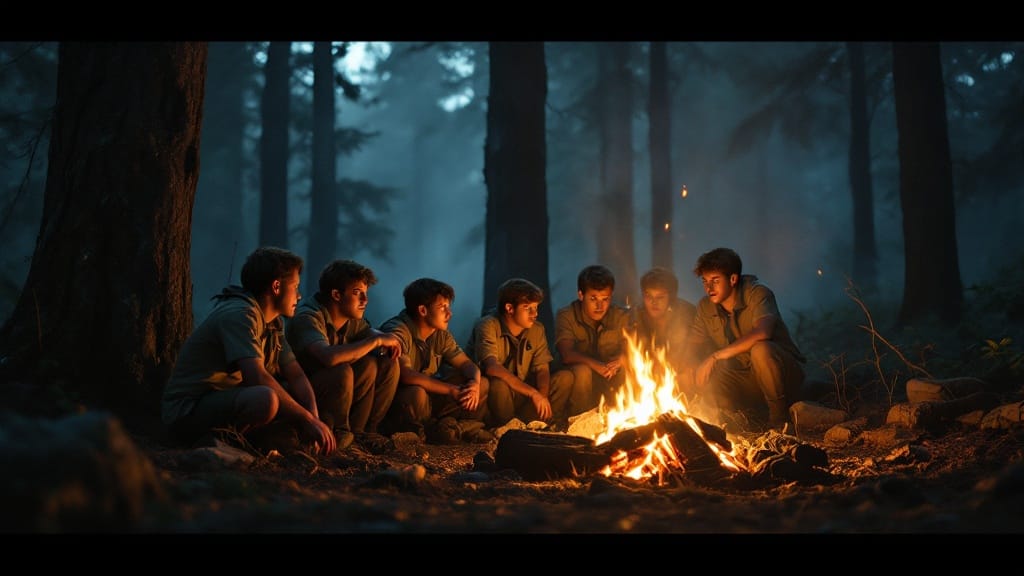Drama
I See Red

Directed by Jack Wiley
Warning – This review contains spoilers.
I See Red tells the story of Luke and Aubrey, an engaged couple who invite friends over for dinner to celebrate their engagement. What starts as a normal evening quickly shifts when Luke begins to confront the emotional abuse he’s been experiencing. Watching the tension between them build, I couldn’t help but feel the weight of Luke’s frustration as it all finally boils over. The film does an excellent job of showcasing the emotional toll that toxic relationships can take, and I found myself drawn into the escalating conflict as Luke’s feelings of inadequacy lead to a powerful, climactic moment of self-discovery.
James Sterling Barton’s portrayal of Luke really resonated with me—his raw emotion during the final outburst felt authentic and intense. Rebecca Dalanhese, as Aubrey, brought a cold and manipulative energy to her role though at times her performance felt a bit exaggerated. That being said I could still feel the chemistry between the two leads and it kept the emotional stakes high throughout the film. The story did a great job building the tension and while I expected the explosion the intensity of it still surprised me and hit hard.
Director Jack Wiley spoke about the collaborative effort that brought I See Red to life, emphasizing the importance of the talented crew he worked with. He mentioned that the film was created in a single night, and the tight timeline pushed everyone to give their best. Wiley’s passion for storytelling and the commitment of his team shine through, as the film reflects a unified vision, capturing a story that they were all eager to tell—sooner than they had imagined.
From a purely technical POV I thought the cinematography worked well in focusing on the characters’ facial expressions, especially during those pivotal, emotional moments. However, the sound was hit or miss for me. At times the dialogue was too quiet making it difficult to fully engage with the conversation, while other moments were loud and clear. The lack of music until the very end also left some scenes feeling a bit empty. That said, the final montage was satisfying and tied the emotional arc together nicely. I also appreciated the editing during Luke’s outburst, which really captured the chaos of the moment. I do think the dinner scene could have used more dynamic shots to build tension earlier, but overall, the film still kept me hooked.
I See Red explores the impact of emotional abuse and how unchecked feelings of inadequacy can fester over time. While there are some technical elements that could use refining, the film’s narrative is compelling, and the performances, particularly James Sterling Barton’s, kept me engaged throughout. I walked away from the film with a clear understanding of its message—there’s only so much someone can take before they break.
This short film powerfully highlights the struggles of asserting oneself in the face of emotional abuse. The film’s core theme of emotional turmoil struck a chord with me, and I think it will resonate with others too. It’s a raw, intense look at how emotional manipulation can push someone to the edge, and the final moments leave a lasting impact.
Comedy
Troop 458

WARNING! This review contains SPOILERS!
Troop 458, written by Trevor Allen, captures the often daunting, yet transformative, experience of being the new kid in a world full of unknowns. We follow Sidney, an anxious boy thrown into his first Boy Scouts campout, where he faces both the perils of acceptance and the strangeness of his eccentric scout leader. As spooky campfire tales start to weave into reality, Sidney is forced to confront his fears head-on, finding moments of humor, adventure, and unexpected camaraderie along the way.
I like the concept of Troop 458 because it blends coming-of-age themes with a playful sense of adventure, all wrapped in an atmosphere tinged with just the right amount of mystery. Allen’s writing brings to life a cast of memorable characters, especially through Sidney’s journey of growth. The tension between humor and fear feels authentic to the Boy Scouts’ setting, and it captures the real challenges kids face when trying to fit in.
What resonated with me most was the screenplay’s exploration of courage—not just in facing mythical dangers but in embracing who you are, quirks and all. Some aspects could benefit from a clearer focus on character motivations and tighter pacing to keep the momentum strong, particularly during scenes that blur the line between myth and reality.
The dialogue is great in many places, offering humor that feels natural for a group of young scouts. There were moments where I felt the conversations could be a bit sharper or more distinct to heighten the comedic or emotional impact. Character development is a strong suit, with Sidney’s evolution being both relatable and satisfying, but secondary characters could have a bit more depth to elevate the ensemble.
Allen’s Troop 458 is polished, with solid grammar, spelling, and formatting that adhere to professional standards. The structure is clean and makes for an easy read, setting up scenes that are visually compelling.
Troop 458 delivers an enjoyable mix of humor, heart, and a touch of the supernatural, leaving me eager to see how it might come to life on screen.
Drama
Ellie

WARNING! This review contains SPOILERS!
Directed by Marcus Mejia
Ellie is a refreshing experience that pulled me right into the world of a young, shy man navigating a work meeting while secretly yearning for a bit of magic in his everyday life. We’re taken through his imaginative, musical daydream—a beautiful escape from reality that reveals his true desires. I loved how the film peeled back layers of his personality without a single word of dialogue. Instead, the music carried the narrative, and surprisingly, it worked so well.
Marcus Mejia did an excellent job blending dramedy elements to keep the film engaging. The moments of humor and more emotional beats make the film feel well-rounded. Mejia’s choice to swap dialogue for music was a bold move, and it paid off. I could feel the character’s internal struggles and hopes as the music brought out emotions words couldn’t.
The lighting felt intimate, almost like it was giving us a window into the protagonist’s soul, and the cinematography perfectly captured the whimsical tone of his daydreams. I noticed how smoothly the editing transitioned between reality and fantasy, which made the story’s pacing feel just right. The sound design was on point, with every beat of music syncing beautifully with the character’s emotional highs and lows.
I loved when the protagonist’s daydream overlapped with reality, creating this seamless blend that felt so relatable. I admired how it portrayed the quiet, unspoken dreams we all carry. It was a reminder of the power of our inner worlds and how much magic lies just beneath the surface of our everyday lives.
Ellie left a gentle yet lasting impression. It’s a unique, heartfelt short film that shows how creative risks can pay off. Ellie is a memorable journey that’s definitely worth the watch.
Drama
Finding Acceptance

Directed by Andrew DeBennett
WARNING! This review contains spoilers.
Watching “Finding Acceptance” was an experience that brought me back to those anti-bullying films we’d see in school assemblies. The story follows Mary, a new student in a wheelchair, navigating the often-tough world of school friendships. Initially, she faces teasing from her peers but finds a genuine friend in Liz, who even manages to extend kindness to Mary’s bully, Max. The message is straightforward and clear: acceptance and empathy matter.
I could see what the director was aiming for—Andrew DeBennett notes that the film was both a joy to create and a personal project. The heart of the story shines through, with Kaylah Pollock (Mary) and Laney Hansen (Liz) bringing warmth to their roles. Their connection feels genuine, even if the overall story feels a bit too familiar.
Technically, the film could have used some fine-tuning. The sound mix was rough, with the music often drowning out dialogue. The editing also felt choppy, making it harder to stay immersed in the story. The dialogue leaned into clichés—phrases like “loser” felt outdated and took away from the realism. The cinematography, however, was a bright spot, creating a warm, inviting feel that suited the film’s positive message.
I felt like the story could’ve benefited from more depth. The bullying that Mary faces is minimal, making her eventual friendships feel somewhat predictable. For younger audiences, this simplicity might be engaging and easy to digest, but it misses the chance to delve into the more complex aspects of acceptance.
In the end, “Finding Acceptance” delivers a positive, albeit simple, message. While it didn’t connect with me on a deeper level, I can see it being a useful film for educational settings, especially for younger viewers learning about kindness and friendship.










